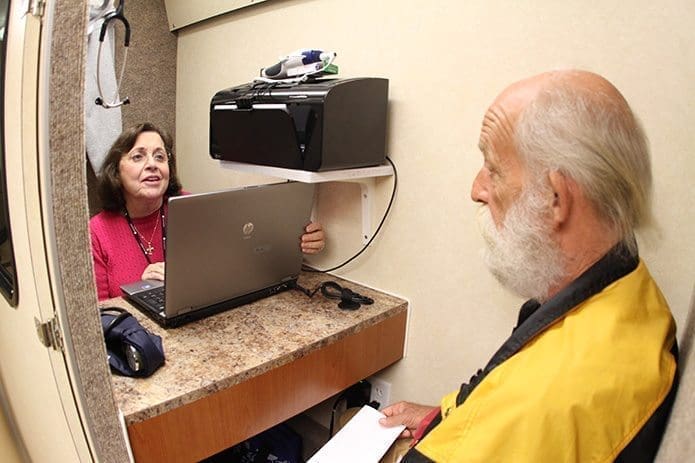 Photo By Michael Alexander
Photo By Michael AlexanderPhysician’s daughter volunteers with Mercy Care mobile clinic
By ANDREW NELSON, Staff Writer | Published November 27, 2014
Kiki Butgereit, 78, of Roswell, and St. Brigid Church, Johns Creek, volunteers with the Mercy Care clinic-on-wheels, which visits five sites in metro Atlanta to offer health care to the poor, homeless and underserved. She answered questions about why she serves in this way.
Q. How do you serve at Mercy Care?
A. I do the intakes for our primary care patients on the coach. First they see a registration person; then they come to me. Now we have laptops and enter everything—current and past health, family history and social history—in electronic health records.
Q. How long have you volunteered at Mercy Care and what spurred you to get involved?
A. When we moved to Atlanta, all five of our children were out of the house. The last one had just started college. I had been noticing how many homeless people there seemed to be both in Birmingham and here. When I saw an article and picture in the paper about Mercy Mobile, I knew that was how I wanted to volunteer.
My father was a physician in Birmingham, and when I was a kid sometimes I rode with him when he made house calls. He treated a lot of poor people for free, and even as a kid I was appalled at the houses they lived in, even though I always stayed in the car. I realized how lucky I was at an early age.
When I called Saint Joseph’s (Hospital) about volunteering, I didn’t know to say Mercy Mobile, and they kept directing me to “pink lady” type stuff in the hospital. That wasn’t what I wanted. I wanted hands-on with patients in the street. Before I could pursue it further, my mother died in Birmingham, and I was tied up for a few years with going back and forth over there. Finally I talked to a man in our then-parish, St. Andrew, who volunteered at the hospital and he told me to call Mercy Mobile. A lot of our patients still refer to us as Mercy Mobile.
Q. How has volunteering at Mercy Care shaped you?
A. The only thing I can say is that contrary to the general public, a group of strange men in hoodies don’t bother me at all. It makes me, and actually all of us, very happy when a patient comes back to see us and thanks us and tells us we made a difference in their life. Then you just pray that they can stay on that path. Most people think folks are homeless because they are lazy, addicted to some substance or mentally ill. Not so. There are countless reasons that people are homeless. I’ve heard some of the most unbelievable things that you would never dream of.
I plan to keep volunteering way into the future, unless something unforeseen intervenes. I work with a great team, and we all seem to gel. We treat our patients with respect and kindness and humor, and we laugh a lot.